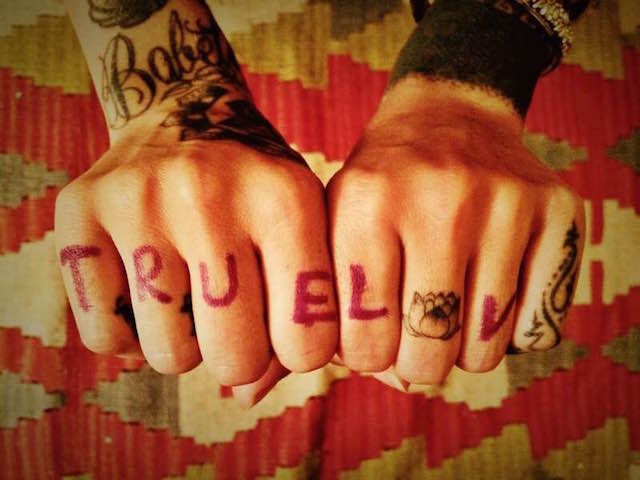Have you ever wondered what “true love” really means? Here’s how Buddhism describes it, and how really falling in love can change your life.
Did you ever fall in love with someone? I did.
Love and longing can drive anyone to perpetually clinging to an object of desire, with no end in sight—a need that can never quite be satisfied, a thirst that can never be quenched.
Can the love of falling in love outweigh the fear of “falling”…?
I guess the moment you fall in love with someone, you’re in the moment, and it’s only afterwards that you’re able to make the analysis, and even realize you were in love. Falling implies surrendering—being out of the mind, or out of your mind! Falling means you’re going somewhere. What happens when you “land“?
Where do you find yourself? Floating on air, on land or in hot water?
What does it mean to fall in love or be in love, or even stay in love?
What Buddhism Says About Fulfillment Based in Attachment
In Buddhism, striving for that which is outside of our true nature, is seen as wasteful. Arbitrarily seeking fulfillment in another is an attachment based on a craving which will always ultimately end in suffering. Perhaps in this searching we can take one step closer to finding our true nature, one’s true vocation, our true purpose.
Time is so short—the memories are fading away. Truth is a cascade of moments. Enjoy the breath, flowing in and out ceaselessly like the waves on the shore in timeless perfection. This is the only true reality.
Even if you die for your lover, is that not sacrificing something that is not yours to give?
In loving you, I love myself, but in loving myself selfishly I neglect you.
In living for you, I forget my own needs.
Ken Wilber said:
“Real love will take you far beyond yourself; and therefore real love will devastate you.”
Is this true? When you sink your hand into another’s spirit and meet emptiness, how can you not feel the wound of love? When the love of your life leaves you, how can you not be left empty? But can love leave a wound and why should emptiness leave you bereft? How can real love devastate you when real love is the absence of superficial egoic needs, the absence of falsehood, and all real love is the presence, and the present? With love, there can be emptiness, but no feeling of emptiness.
Can you actually remove love…can it ever be extinguished or forgotten?
What is Love? From a Buddhist Perspective
If love is the presence, the sacred consciousness, the Divine expansiveness, is it possible to subtract from it, remove from it, and delete it from your consciousness? Is it possible to forget it?
Love is an experience of being whole. When we link it to another, we become dependent on that other for the fulfillment or satisfaction of our love fantasy. True love does not require a vehicle for its fulfillment or expression.
Osho said that “love demands nothing. It simply shares.”
The Buddhist Concept of Dukkha and How it Pertains to True Love
Another way to look at it is within the context of the first of Buddha’s noble truths—“life is dukkha.”
Dukkha is divided into suffering, change and conditioned states.
1. Suffering: part 1 of Dukkha.
Consciousness as the created form, or the potentiation of thoughts, fills the universal ether. This immediately creates an existential loneliness, which can never be entirely filled until it (the creation) is no longer separate from the formlessness of Divine consciousness. This separation is loneliness. This is the suffering part of dukkha—the separation from God.
2. Change: part 2 of Dukkha.
This world of created forms, and as yet uncreated potential is always changing. As we enter it, we change, and eventually pass through it, to the beyond. One thing is certain—the fluid of life is a changing stream.
3. Conditioned states: part 3 of Dukkha
We are affected by everything around us. Energy created can never be destroyed; it is merely transferred/transformed to evolve into a new form. Thus everything that “is” affects everything else that “is.” The spider weaves its web, creating a living matrix of awareness.
We experience romantic love within the context of these three aspects of creation. We suffer most when we are in fear. Sometimes the pain can seem insurmountable…we can seem alone in the vast expansive universe. Yet, at its core, suffering is an illusion.
Our fear of suffering is often far worse than the suffering itself.
To love is to suffer. To avoid suffering, one must not love. But then, one suffers from not loving. Therefore, to love is to suffer; not to love is to suffer; to suffer is to suffer. To be happy is to love. To be happy, then, is to suffer, but suffering makes one unhappy. Therefore, to be happy, one must love or love to suffer or suffer from too much happiness.
~ Woody Allen
To be identified with something outside of yourself is to invite suffering.
Suffering is derived from perceiving a loss.
How True Love Extends Beyond Suffering
Authentic love is whole, complete and, in essence, beyond suffering. The absence of love is suffering. The illusion of loss leads to suffering. When something dies, you don’t lose it, because you never owned it. We suffer most when we are attached to the illusion. True love does not leave a wound when it is lost, because true love can never be lost. Once created, “it” exists forever within the unity of the Divine sphere. The divine conversation of love is something beyond a mere notion or discussion—it is alive, filled with the budding possibility of a butterfly about to open its wings for the first time.
Love is just a word until someone comes along and gives it meaning.
~ Anonymous
Rumi asks,
“Oh lovers, where are you going? Who are you looking for? Your beloved is right here.”
Love: Ceaselessly searching for the ultimate feeling of completion. That which is searched for, exists already within. Today, don’t wish it was another day—wish it was today. Then you will realize yourself already blessed. Enjoy the paradoxes. And most importantly, keep falling in love!~
Bonus: How to know if He or She is The One:
Relephant Reads:
> Your Soulmate Isn’t Who You Think It Is.
> How to Find the One.
Like elephant love on facebook.
Ed: Lynn Hasselberger



Read 72 comments and reply